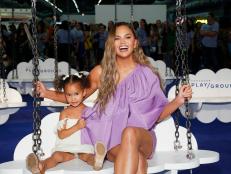Kourtney Kardashian Says Co-Sleeping with Her Kids Helps Everyone Get More Sleep, but is it Safe?
Here’s what a new study says.


NBC
Co-sleeping is one of those hot-button topics that can really ignite debates among mothers. While some moms are adamant about keeping their babies out of their beds, others would prefer if their little ones snoozed in their own crib but, out of desperation and exhaustion, their baby ends up in bed with them every night. However, moms like Kourtney Kardashian are fans of co-sleeping with their babies.
On her website Poosh, Kardashian sang the praises of a good night’s sleep thanks to having all three of her kids in her bed. “I realize that people have many different ways for getting their kids to sleep through the night, and I believe that if something works for your family, then that is what is most important,” Kardashian wrote. “We all just need our sleep, right? In my house, I found that a co-sleeping strategy worked best.”
Having big kids in your bed is very different from a baby. The American Academy of Pediatrics has been adamant about warning parents to refrain from co-sleeping with their baby. The AAP’s safer sleep practices states that your baby should sleep alone to decrease the risk of Sudden Infant Death Syndrome (SIDS), or suffocation.
However, a study that focused on breastfed babies may suggest a different plan when it comes to co-sleeping. According to a new study published in the Academy of Breastfeeding Medicine, breastfeeding mothers and babies should not be are advised against bed-sharing, as long as no dangerous circumstances exist.
So, what are considered “dangerous circumstances?” The authors of the study list sleeping with an adult on a sofa or armchair; sleeping next to an adult who is impaired by alcohol, medications, or illicit drugs; sleeping with mothers who smoked during pregnancy; and sleeping with babies who were born preterm.
The authors go on to say that parents should be educated on bed-sharing safety and cite evidence from their research that shows “breastfeeding mothers instinctively form a protective position around their baby.” They added that breastfed babies who co-sleep should sleep on their backs and are naturally positioned away from pillows or blankets that could obstruct their airways.
However, not all experts are in agreement with these findings and strongly feel that parents should stick to the safer sleep practices already recommended.
For more information, consider the AAP’s Safe Sleep Guidelines:
- Until their first birthday, babies should sleep on their backs for all sleep times—for naps and at night
- Use a firm sleep surface like a crib, bassinet, portable crib, or play yard
- Room share—keep baby's sleep area in the same room where you sleep for the first 6 months or, ideally, for the first year.
- Only bring your baby into your bed to feed or comfort
- Never place your baby to sleep on a couch, sofa, or armchair
- Keep soft objects, loose bedding, or any objects that could increase the risk of entrapment, suffocation, or strangulation out of the baby's sleep area.
- Bed-sharing is not recommended for any babies
- It is fine to swaddle your baby but be sure to place your baby on his or her back
- To reduce the risk of SIDS, try giving a pacifier at nap time and bedtime.















